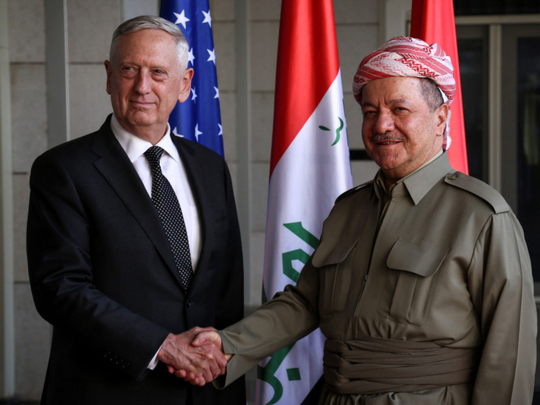
Arbil: Defense Secretary Jim Mattis asked the president of Iraq’s Kurdish autonomous region on Tuesday to postpone a referendum next month on Kurdish independence.
Mattis’ meeting with President Massoud Barzani was part of a broader push by American officials to head off what they fear may be a new period of political instability as Iraq continues its battle against Daesh.
“Our point right now is to stay focused like a laser beam on the defeat of Daesh and to let nothing distract us,” Mattis told reporters, shortly before flying to Irbil, the capital of the autonomous region.
Secretary of State Rex W. Tillerson made a similar appeal for the Kurds to postpone the referendum, which is scheduled for Sept. 25, in a telephone call earlier this month with Barzani. So did Gen. Joseph L. Votel, the head of U.S. Central Command, who visited Iraq last week.
But Kurdish officials said that Barzani did not pull back from the referendum in his meeting with Mattis even as he has kept the door open for further talks with Iraqi officials in Baghdad and with the United States.
“We intend to proceed with the referendum on Sept. 25 to allow our people to determine their own future,” Masrour Barzani, a top Kurdish security official and the son of Massoud Barzani, said Tuesday night. “This remains the only solution; forced coexistence in Iraq isn’t working.”
Many Kurds have long dreamed of independence, though their region is burdened by serious economic problems, and a Kurdish state is opposed by neighbors like Turkey and Iran, which also have large Kurdish populations. The vote, Kurdish officials also emphasize, would not lead to an immediate break with Baghdad but rather a long process of negotiating an amicable divorce.
Halgurd Hikmat, the top spokesman for the Kurds’ Ministry of Peshmerga, as the Kurdish fighters are known, dismissed concerns that the referendum would hamper the campaign against Daesh, arguing that it might even give Kurds more of a reason to fight.
“It is not going to have any impact,” he told reporters traveling with Mattis. “We are confident in our ability to fight Daesh regardless of that taking place.”Mattis was in Ankara on Wednesday for talks with Turkish leaders expected to focus on Washington’s arming of a Syrian Kurdish militia, which Turkey views as a terror group, in the fight against Daesh.
In Ankara, he will hold talks with President Recep Tayyip Erdogan and Defence Minister Nurettin Canikli.
Turkey, an important NATO ally of the United States and part of the coalition against Daesh, is incensed that Washington has been arming the Kurdish Peoples’ Protection Units (YPG) militias in the assault on the militants’ stronghold Raqqa, in northern Syria.
Turkey regards the YPG as the Syrian affiliate of the outlawed Kurdistan Workers’ Party (PKK).
Meanwhile, Turkey’s foreign minister was in Baghdad Wednesday, where he reiterated his country’s demand that the Iraqi Kurds cancel a scheduled referendum for independence.
Mevlut Cavusoglu told reporters in Baghdad that Turkey’s expectation from Arbil, the capital of the autonomous northern Iraqi Kurdish region, is “very plain and clear—and that is the annulment of this referendum decision.”
The vote on whether to secede from Iraq is slated for Sept. 25.
Cavusoglu says Turkey has been saying all along that “the referendum decision is wrong” and that he would tell the Iraq Kurdish leaders so “once more” when he visits Arbil later on Wednesday.
Turkey—which has a large Kurdish population and is battling Kurdish rebels—is strongly opposed to an independent Kurdish state.












